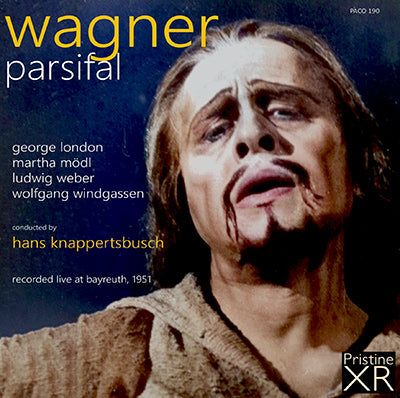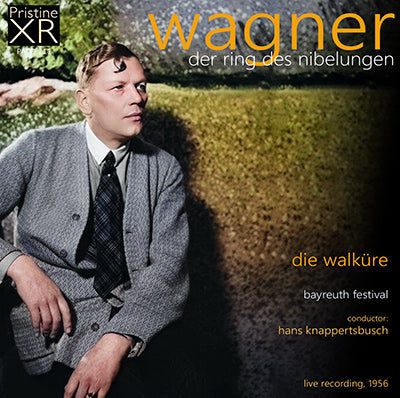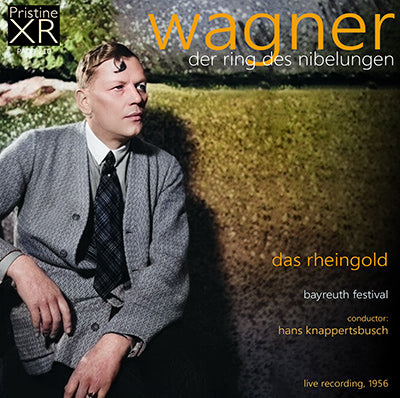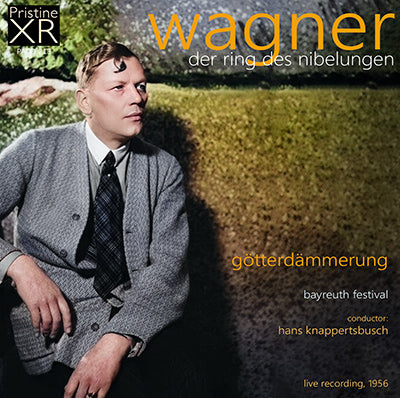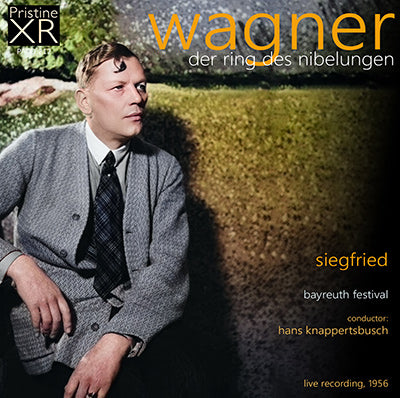Hans Knappertsbusch
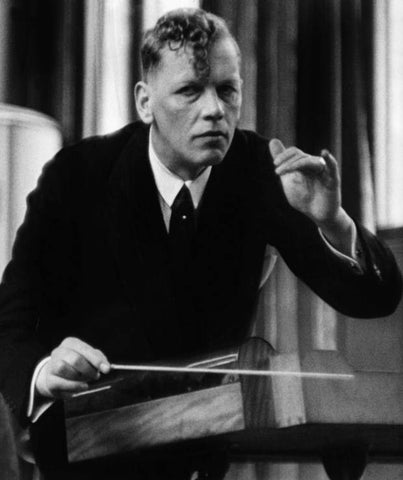
Knappertsbusch was born in Elberfeld, today's Wuppertal. He studied philosophy at Bonn University and conducting at the Cologne Conservatory with Fritz Steinbach. For a few summers, he assisted Siegfried Wagner and Hans Richter at Bayreuth. He began his career with conducting jobs in Elberfeld (1913–1918), Leipzig (1918–1919) and Dessau (1919–1922). When Bruno Walter left Munich for New York, Knappertsbusch succeeded him as General Music Director of the Bavarian State Orchestra and the Bavarian State Opera, with a lifelong contract. Knappertsbusch later refused to join the Nazi party.
In April 1933, Knappertsbusch, along with Richard Strauss and other prominent German musicians, issued and signed a short statement in the newspaper "Münchner Neueste Nachrichten", titled Protest der Richard-Wagner-Stadt München ("protest of the Richard Wagner city of Munich"), in reaction to Thomas Mann's Leiden und Größe Richard Wagners ("Woes and greatness of Richard Wagner"), a critical but ultimately admiring lecture about the composer. The signatories, who generally held staunchly conservative (although not necessarily National Socialist) world views, considered the text, which was essentially a psychoanalytical treatise on Wagner, as denigrating and indecent. In addition to the Nazi Party's demands for an oath of allegiance shortly thereafter, which applied to all writers and artists in general at that time, their efforts contributed to Mann's decision to never return to Germany until the end of World War II.
In 1944, he was added to the so-called Gottbegnadeten list (literally "God-gifted list"), which excluded him from military service. Despite his animosity towards the Nazi regime, Knappertsbusch never considered emigrating from his home country, being deeply rooted in German arts and culture.
When World War II ended, Knappertsbusch returned to Munich, where he lived and worked for the remainder of his life. He continued to guest conduct in Vienna, as well as to make appearances at the Bayreuth Festival. He conducted the first performances of Der Ring des Nibelungen at the reopening of the Bayreuth Festival in 1951, though only the Götterdämmerung survives. The Parsifal of that year, in which Martha Mödl made her Bayreuth premiere as Kundry, remains among the marquee recordings of that role. Mödl, the preeminent Kundry and Wagner actress of the twentieth century, would go on to sing that role under Knappertsbusch for the rest of the decade. He was one of the favorite conductors of the Wiener Philharmoniker, leading the orchestra in Vienna, Salzburg and on tour abroad, although generally he rarely toured outside the German-speaking world.
Knappertsbusch became famous for his interpretations of the works of Ludwig van Beethoven, Anton Bruckner, Johannes Brahms and Richard Strauss, but his greatest legacy is his remarkable treatment of Richard Wagner's works, which he loved most dearly. He is widely considered as one of the greatest Wagner-conductors of all time.

Hans Knappertsbusch
Knappertsbusch was born in Elberfeld, today's Wuppertal. He studied philosophy a...
WAGNER Parsifal
Live recording, 1951
Total duration: 4hr 29:23
Amfortas - George London
Titurel - Arnold van Mill
Gurnemanz - Ludwig Weber
Parsifal - Wolfgang Windgassen
Klingsor - Hermann Uhde
Kundry - Martha Mödl
Altsolo - Ruth Siewert
Bayreuth Festival Orchestra & Chorus
conducted by Hans Knappertsbusch
BRUCKNER Symphony No. 3
BRUCKNER Symphony No. 4 'Romantic'
BRUCKNER Symphony No. 5
Studio recordings, 1954-56
Total duration: 2hr 54:10
Vienna Philharmonic Orchestra
conducted by Hans Knappersbusch
BEETHOVEN Piano Concerto No. 4
BEETHOVEN Piano Concerto No. 5
Studio recordings, 1954/57
Total duration: 73:02
Clifford Curzon, piano
Vienna Philharmonic Orchestra
Hans Knappertsbusch, conductor
WAGNER Die Walküre
Live performance, 1956
Total duration: 3hr 50:30
Siegmund - Wolfgang Windgassen
Sieglinde - Gré Brouwenstijn
Wotan - Hans Hotter
Brünnhilde - Astrid Varnay
Hunding - Josef Greindl
conducted by Hans Knappertsbusch
WAGNER Das Rheingold
Live performance, 1956
Total duration: 2hr 37:32
Wotan - Hans Hotter
Alberich - Gustav Neidlinger
Mime - Paul Kuen
Fasolt - Josef Greindl
Fricka - Georgine von Milinkovic
Bayreuth Festival Chorus and Orchestra
conducted by Hans Knappertsbusch
WAGNER Der Ring des Nibelungen
1. Das Rheingold
2. Die Walküre
3. Siegfried
4. Götterdämmerung
Live performances, Bayreuth Festival, 1956
Bayreuth Festival Chorus and Orchestra
conducted by Hans Knappertsbusch
WAGNER Götterdämmerung
Live performance, 1956
Total duration: 4hr 33:28
Brünnhilde - Astrid Varnay
Siegfried - Wolfgang Windgassen
Hagen - Josef Greindl
Alberich - Gustav Neidlinger
Gunther - Hermann Uhde
Gutrune - Gré Brouwenstijn
Bayreuth Festival Chorus and Orchestra
conducted by Hans Knappertsbusch
WAGNER Siegfried
Live performance, 1956
Total duration: 4hr 10:55
Siegfried - Wolfgang Windgassen
Mime - Paul Kuen
Brünnhilde - Astrid Varnay
Wanderer - Hans Hotter
Alberich - Gustav Neidlinger
Bayreuth Festival Chorus and Orchestra
conducted by Hans Knappertsbusch
-
Previous
- Page 1 of 2
- Next

